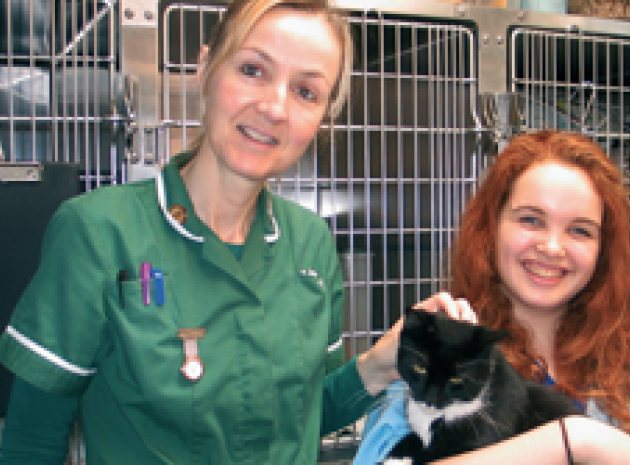It’s June 2013 and the scene is a hall at Sydenham School in Lewisham. The room is set with 29 tables at which sit business-suited adults with empty chairs before them awaiting the arrival of batches of Year 10s. When they arrive, the girls are suitably hyped up following classroom time preparing for their mock interviews.
This is the school’s ‘Employability Day’ enabling students to find out how many of the activities and interests they pursue at school and beyond carry weight with employers. It is also a chance to work out how to tackle a set of standard questions. “These range from quite general ones to others that test their ingenuity and creativity,” says Jene Kerr – Careers and Enterprise Coordinator for Sydenham School.
“One purpose of the event is getting students to reflect on themselves and to see how they can already show lots of evidence for having the aptitudes employers are seeking: meeting deadlines; team-working; and the ability to reflect on their strengths and weaknesses.”
“The event is a key part of Sydenham School’s careers programme and is strategically scheduled just ahead of our Year 10 girls going out on two-weeks of work experience,” says Sydenham School headteacher Carolyn Unsted. “For many students it will be the first time they have experienced such a conversation, and it impresses on them that the work environment is very different from others they are used to.
These are important lessons that will help them make the most of the work place opportunities they have ahead of them this term.”
Such a joined up approach is the exception rather than the rule, according to the findings of last month’s Ofsted review of careers guidance: ‘Going In The Right Direction’. Its gloomy conclusion, on the basis of research conducted in 60 secondary schools and academies, was that the careers advice and experience offered by schools for young people is generally pretty poor. Despite schools being legally responsible for providing effective, independent guidance in this respect since September 2012, it seems that most are falling far short of what young people deserve or need; especially given the complexities of a world in which competition for satisfying and well-paid work will be increasingly fierce and portmanteau careers the norm.
“At Sydenham School, the students benefit from an effective mix of classroom courses, in-school support and bought in services,”
explains Jene Kerr. “For example, the Employability Day and occasional careers fairs are run for us by former members of the council’s education business partnership team now in business for themselves. But we are also fortunate in having a council work-experience team to call on and whose services are invaluable in ensuring the vast majority of our 200 plus year 10s enjoy effective two-week placements across London.”
“In Lewisham, we maintain a data-base of over 5,500 businesses vetted to ensure they can offer the boroughs Year 10s safe and useful placements. All eligible pupils are able to log in to see what’s available and to drill down into the information so they can weigh up everything from the kind of distances they may have to travel to the likely dress-code they’ll encounter,” explains the borough’s work experience manager Paul Goddard. “We visit all potential employers signing up for work experience including ‘self-finds’ – those the students sort out for themselves. And a key part of our checklist is ensuring pupils will be undertaking tasks likely to benefit them.”
Mr Goddard is at pains to stress that the service is also there to reassure employers that they do not have to put up with students if they are not living up to what’s expected of them in terms of attendance, engagement or behaviour; being first point of call should a placement start to misfire.
And the approach seems to come up trumps if Sydenham School is anything to go by.
“Inevitably there are a few pupils who don’t manage to make the most of the opportunity,” says Jene Kerr, “and if things really break down then they come back to school for what remains of their fortnight – but it’s only ever a handful for whom this is the case while the rest benefit enormously.”
It’s a view echoed by Carolyn Unsted. “We see the positives when the Year 10s come back to us and tell us of their experiences as part of the formal debriefing process,” she confirms. “It may only be two weeks that they are out for but most students return feeling as if they have grown up a lot and with a clearer idea of what they want to do after school.”
15-year-old Sydenham School student Isobel Hecker spent her fortnight at independent veterinary surgery All Creatures on Lavender Hill, in Wadsworth supporting the work of both nurses and administrative staff. “It is not a place for someone who thinks they’ll be continuously cuddling kittens and puppies,”
says acting head nurse Catherine Drew. “It’s a very varied job requiring hard work, intelligence and independence. There are plenty of soft skills needed too when dealing with the public who are often anxious about a family pet, and then there are the less glamorous aspects such as cleaning up after operations and ensuring the theatre equipment is ready at all times.”
“I love animals and have a lot of pets,” said Isobel, “but this is not a job for the squeamish or sentimental. I have witnessed some procedures which can be a bit bloody and I have enjoyed how unpredictable each day can be with sometimes exotic creatures such as a robin injured by a cat in among more usual domestic animals. It survived and the person who brought it in was overjoyed!”
Among the additional benefits of the placement was the chance to work alongside Isabel Johanson, at the end of the third of five years training to be a vet. “I’ve been able to discuss the career with her,” says Isobel Hecker, “and I am convinced this could be something I could do after school – luckily I am good at sciences. There are lots of directions one can go in as a qualified vet.”
That Isobel’s experience is common among Sydenham School pupils is also a reflection that the building blocks leading to students making the most of such fine-tuned experiences have been laid consistently over their entire secondary career. “As soon as girls join the school they find themselves involved in a coherent PSE programme, many elements of which directly underpin the discrete careers opportunities they meet in Years 9 and 10,” explains human sciences curriculum leader Sue Horn. “Careers feature alongside discussions of healthy lifestyle choices in Year 7, for example, while in Year 8 girls research the salaries that certain jobs command as a part of their personal finance education and in Year 9 effort goes into assessing the post-16 goals the girls may be germinating as a key part of their GCSE option-choosing.”
Back in the hall, Ellie Brignell Cash of ER Events, organisers of the Employability Day for Sydenham School is in a reflective mood, now the Year 10 girls have returned to their classrooms. “Many of our interviewers come back year after year because they find the day so rewarding,” she comments. “They are used to speaking to students and are very skilled at putting them at their ease. It can be nerve-wracking for the girls but it is great to witness their excitement once the interviews are over – they come out buzzing.”
“It was fascinating to see whom the employers decided in the end to ‘hire’,” says Jene Kerr. “In a lot of cases there were surprises, and some of the girls derived a real boost from standing out so well.”
The post-interview feedback about 15-yearold student Sybille Danouma illustrates Kerr’s point. “What a star!” said construction firm Willmott Dixon’s Patricia Roberts. “You were enthusiastic from the get-go and would fit into any company – you’re hired!”










